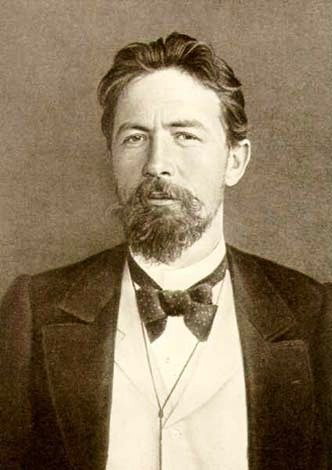Anton Chekhov was a literary genius, that’s a given. But I feel he was also a medical genius, albeit one who never practiced formally.
For those (probably few) of you who don’t know, Chekhov put himself through medical school by selling little stories and vignettes to the Moscow papers, because newspapers in the 19th century published fiction as well as the news. His biographers are not sure just why he never formally practiced after he received his MD degree. Possibly it was his health; he began to show symptoms of the tuberculosis that finally killed him, when he was a student. Or possibly it was because he could make more money from his fiction!
Parenthetically, although he did not have a practice, he would treat anyone who came to him for help. When he visited friends, word would spread, “There’s a doctor at ___’s house who will treat people for nothing!” And the next morning there would be a line of miserable, desperately ill people at the door…
Literature has many functions: it amuses, frightens, enlightens, disgusts…you name it. Anton Chekhov used it for a rather unusual purpose. After many years of reading his short story, “A Father,” I believe he wrote it in order to illustrate a medical theory that was unacceptable in his day.
Now, everyone knows that alcoholism is a disease, right? It’s a terrible, often fatal, disease that can be treated. Everybody knows that.
However, everybody has not always known that. Up until about the middle of the 20th century, alcoholism was considered a horrible and hopeless moral flaw, indicating a truly weak, awful person. I believe Chekhov, a matchless observer, came to the conclusion, nearly 100 years ahead of his time, that alcoholism was NOT a sign of moral weakness, but was a disease like any other. However, if he had attempted to publish this theory in the medical journals of his time, he would have been laughed out of the profession.
So instead, he wrote “A Father.” N.b. Google it and read it if you like; it’s only a little over four pages long. Otherwise, a brief outline/spoiler follows.
A young man’s father comes to visit him. From the first words the father speaks, it is apparent that he is a hopeless alcoholic. He has come to borrow money from his son, who obviously has to first go borrow it himself. The son also gives his father a new pair of shoes he’s just bought and then takes him home. Several times during the trip, the father tells the cabbie to stop at a tavern. The son sits and waits for him during each lengthy visit. The father’s conversations with his son alternate between drunken boasting and regret, during which we learn that he has been an alcoholic since the son’s childhood. He describes the ways he pesters and embarrasses all his sons, and how they still treat him with love and respect.
This makes a modern reader very impatient. Our current take on filial devotion is that it must be earned. Why, we wonder, is this young man so patient? Does he not have a spine?
They arrive at the father’s lodging, and are drunkenly greeted by a woman the father consistently refers to as “my virago.” She is not the son’s mother. The father begins to berate the boy, alternating with maudlin remarks full of self-hatred and regret. His last word to the young man is: “Attendez!”
“Attendez!” In other words “Wait!” But for what? “Attendez” is the last word in the story…and we have to wonder. Is it addressed to the young son, or to…us? Wait? Well, I have an idea. Let’s change the story and make the father dying of terminal…oh, cancer, or lupus, or heart disease, take your pick. In those cases, the son’s actions become understandable. A son faced with a terminally ill father could easily show him patience, devotion, care, and understanding. He would be tolerant of ill temper, depression, irrationality…of course.
So. Wait! Wait for what? Wait until people realize that this man is dying of a terrible disease? You see, like any great writer, Chekhov leaves the question up to us.



Comments by Readers
Dick Conoboy
Jul 09, 2017One might surmise that the last word “attendez” would be directed more generally as it is the polite and also plural form of the imperative of the verb attendre. Were it directed to his son only, the man would more likely have said “attends”, the familiar form of the imperative.